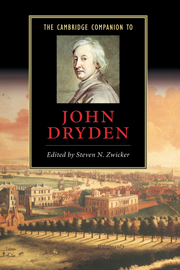Book contents
- Frontmatter
- Part 1 Pleasures of the imagination
- 1 Composing a literary life
- 2 Dryden and the theatrical imagination
- 3 Dryden and the energies of satire
- 4 Dryden and the imperial imagination
- 5 Dryden and the invention of Augustan culture
- 6 Dryden’s triplets
- Part 2 A literary life in Restoration England
- Part 3 Courting and complying with danger
- Further reading
- Index
- Series List
1 - Composing a literary life
from Part 1 - Pleasures of the imagination
Published online by Cambridge University Press: 28 May 2006
- Frontmatter
- Part 1 Pleasures of the imagination
- 1 Composing a literary life
- 2 Dryden and the theatrical imagination
- 3 Dryden and the energies of satire
- 4 Dryden and the imperial imagination
- 5 Dryden and the invention of Augustan culture
- 6 Dryden’s triplets
- Part 2 A literary life in Restoration England
- Part 3 Courting and complying with danger
- Further reading
- Index
- Series List
Summary
John Dryden has come down to us through the exemplary practices of literary editing: a large number of uniform volumes, learnedly prefaced, packed with history and explanatory notes. Who first thought of The Works of John Dryden? Not, I think, the poet himself. During his long writing life Dryden showed little interest in collecting or revising his work; neither he nor apparently anyone else kept his manuscripts; and Dryden seldom wrote of, or even seems to have imagined, a coherent and progressive literary career of the kind that was often on Spenser's or Milton's mind. Of course, the idea of collected works would have been obvious to Dryden from the humanist editions of classical authors, from The Works of Ben Jonson or the Shakespeare folios, or from collected editions even closer to hand - Cowley, Cleveland, and Suckling. Dryden himself contributed an elegy to John Oldham's Remains, and he knew too of the uvres of Corneille and Racine. His shrewd publisher Jacob Tonson made an effort at such collection in the 1690s, but the sustained impulse to collect “the works” began after Dryden's death, first with Tonson's various compilations of poems and plays, then at the end of the eighteenth century with Edmond Malone's edition of Dryden's prose. Sir Walter Scott's monumental edition in eighteen volumes appeared in 1808, to be revised late in the nineteenth century by George Saintsbury, and in the early 1950s planning began for what would, half a century later, become The Works of John Dryden, complete in twenty volumes that bind together, apparatus and all, close to ten thousand pages.
- Type
- Chapter
- Information
- The Cambridge Companion to John Dryden , pp. 3 - 14Publisher: Cambridge University PressPrint publication year: 2004



